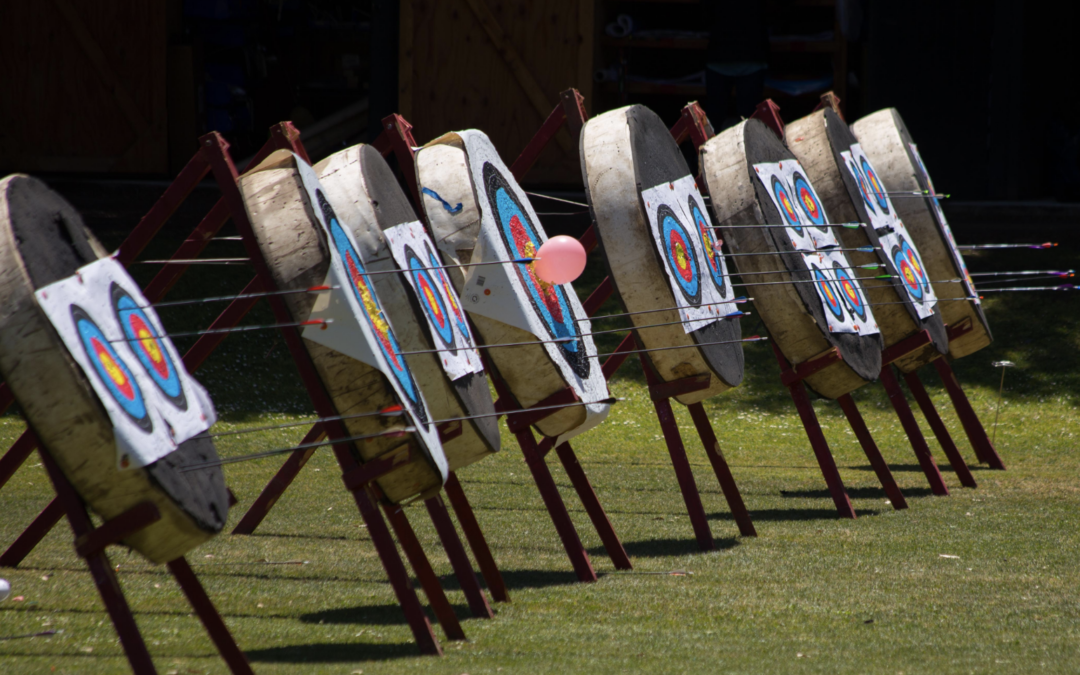Are we having fun yet?!
It’s time to pick up your equipment and head to the archery range.
Remember archery? The ultimate summer camp activity.
You might be thinking to yourself, “How the heck are they going to turn archery into a public speaking lesson?”
We’re so happy you asked! Ready for the answer?
Think of your quiver – in case you forgot, it’s that basket-thing that holds the arrows – as the container for all the words you plan to say.
Think of your bow as your confidence.
And brace yourself…think of the target as your audience.
*Mind blown*
This is where we step it up a notch. Stationary targets are not an apt metaphor when it comes to post-Covid audiences. So let’s modify it a little bit:
Let’s make it a moving target, which is a better description of the attention span of the average audience (the fruit fly comes to mind).
OK, now we’re ready to work it.
You carefully select the words for a compelling introduction and line up your arrow, hoping it will soar through the air with the greatest of ease and land exactly where you hoped it would.
But it travels way off the mark and slides across the wet grass into the bushes. *insert favorite swear word.*
That’s because your confidence was off. And that’s because you kept telling yourself you were nervous.
Remember the thing we’ve said at least 30 times since 2017 when we started this newsletter: nerves are a good thing. They make you work harder because you care what your audience thinks. Why would you let that genuine emotion turn into high anxiety?
Do you have a ritual that helps you find a calm and collected state of mind before you start speaking?
If yes, that’s great, keep it up. If no, here are two examples from clients that work really well.
1. Any self-talk about feeling grounded and balanced: “I am standing on solid ground. I feel the weight of my feet on the floor and I am supported.”
2. “There’s a friendly face that’‘s smiling at me. I feel calmer now.” As soon as you get on stage (whether it’s your regular seat in the conference room or an actual stage) look for someone who is sending positive vibes. Why? Emotional contagion. Brain-to-brain coupling. It will help you feel relaxed and ready.
3. Change the word you use to describe your emotional state. Don’t say “nervous,” say “excited.” It’s a neuro hack.
Now when you release that arrow, and it has a much better chance of hitting the target.
What about the quiver of words? Well, in a nutshell, don’t leave it to chance. Don’t do what one speaker did and “rehearse in your head” as if that’s all it takes to be prepared.
And what about moving targets? You have to grab their attention and keep it. Do you know the answers to these Audience Analysis questions?
- Why are you speaking?
- What’s the purpose of your presentation?
- What does your particular audience need to hear from you?
- What do you want them to know or do?
- How aligned are they with your position or point of view?
These kinds of prep questions will help your message land and have the impact you intended.
OK, campers…time to wrap up our archery session:
Let determination steady your hand, focus sharpen your aim,
and your passion help you connect with your audience.
Pro Tip: Use the archery metaphor in your presentation prep and actually name each arrow that will come with you into the room: opener/grabber, facts/data, key message 1/2/3, conclusion, call-to-action.
We hear the whistle blowing…see you at the snack bar.

